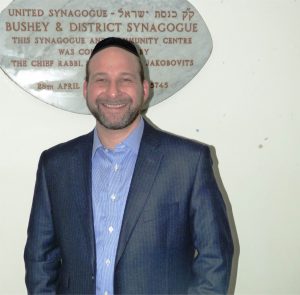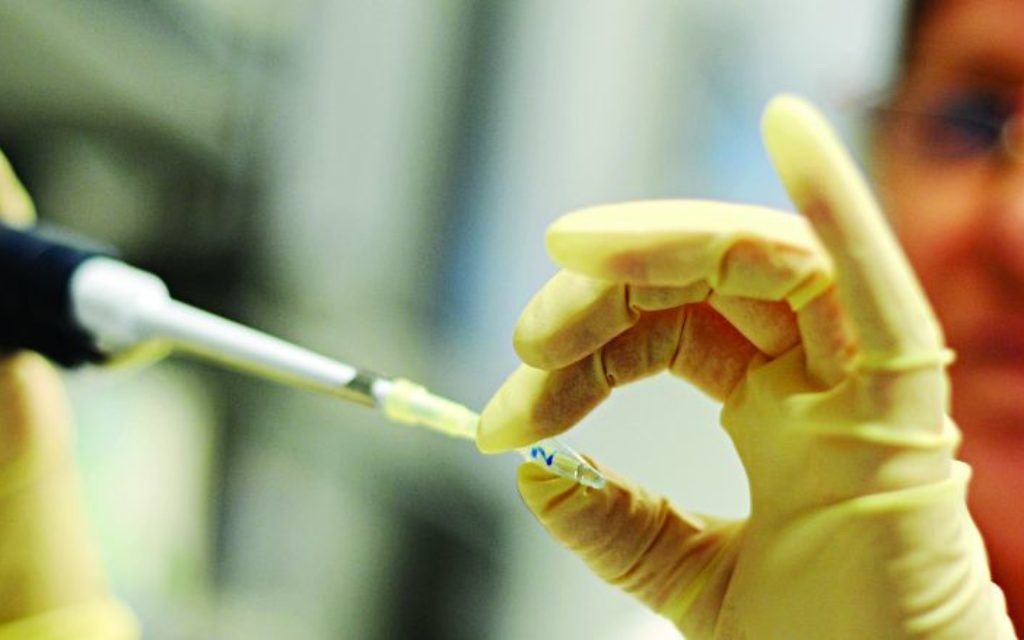It’s one small snip for man, one giant snip for mankind
Gene editing, a process which could have major implications for the Jewish community, is almost upon us, say scientists
With a quick snip of their genetic scissors, scientists this month removed a dangerous disease-carrying mutation in human embryos for the very first time.
It showed that gene editing can be done safely and successfully, and that it is almost upon us. To many, it was one small snip for man, one giant snip for mankind.
What happened? Scientists repaired dozens of embryos using a new technology called CRISPR/Cas9, fixing a mutation that causes a heart condition, which in turn can lead to sudden death. If those embryos had developed into babies, those babies would have been born without the mutation and would not have passed it on to their own children.
Get The Jewish News Daily Edition by email and never miss our top stories Free Sign Up
The prospect of eradicating genetic diseases is particularly pertinent for Jews, whose heritage means they are more likely than others to carry any one of the many nasties science now hopes to bin.
News of the breakthrough was welcomed this week by Jewish charities and rabbis as “an exciting step forward” that promises to cut the risk of Jewish couples giving birth to babies born with severe and sometimes fatal conditions.
“It’s a great step forward into what could potentially be treatments for disabling and tragic conditions,” said Katrina Sarig of Jnetics, formerly known as Jewish Genetic Disorders UK.
“But it’s one positive step on a very long journey. It doesn’t offer solutions here and now. We need to make sure that it’s safe and transferable, and in-line with Jewish ethics, because it raises lots of issues.”
Prominent among those issues, says Rabbi Elchonon Feldman from Bushey United Synagogue, is how far we go with it. “The problem is: what next?” he says. “In terms of what you can edit, there’s a spectrum, from fatal genetic disorders to hair colour or being able to play the piano. That’s where there’s a strong ethical, moral and Jewish hesitation. We’re not matching Ikea furniture to a room.”

Picture credit: Bushey United Synagogue
Equally, says sociologist Keith Kahn-Harris, “Jews are not a genetically homogenous people… Genetically we are not one people,” he notes. “So this is a breakthrough that will impact only on Jews whose specific genetic heritage means they are likely to be at risk of carrying these diseases and disorders.”. Yet, in terms of the technology itself, Kahn-Harris says: “I very much doubt there will be any resistance from the Jewish world.”
Rabbi Feldman is all for it too, and for good reason. Among the couples he counsels are those where both are carriers of the same severe recessive Jewish genetic disorder. In such cases, there is a one in four chance that their child will be affected by the condition.
Some undergo pre-implantation genetic diagnosis (PGD), which means having IVF and selecting out the healthy embryos, but this isn’t suitable for everyone. This new step will soon offer other avenues.
“This is even better than pre-implantation screening,” says Feldman. “The ability to remove the problematic gene and have the healthy partner’s genes used instead is the best possible way.
“You don’t need to get rid of embryos, you’re not wasting seed, you’re not worrying about abortions, you just remove the part that’s the problem. It’s really good stuff.”
This week, a spokesman for the London Beth Din gave it the stamp of approval, saying: “The halachic view is clear, that where this approach can be used to alleviate the consequences of a disease and thereby prevent suffering it is wholly appropriate to do so.”
But not everyone is convinced. “It’s currently being discussed by rabbis within the Charedi community, with strong views for and against,” says Levi Schapiro, director of Jewish Community Council (JCC) in Stamford Hill, whose organisation is planning a roundtable discussion on the topic in September.
“We’re taking advice from medics, but it’s not a straight-forward issue and could become a divisive debate,” he says, adding: “God creates illnesses but also creates medicine… we could look at this as a medicine to prevent future diseases”.
Sarig is more sanguine. “It provides another fantastic option for high-risk couples,” she says. “It’s another tool to remove risk, so potentially very exciting and positive, because it presents the opportunity for couples to have healthy children. But it needs more research, and it consolidates the need to increase awareness and screening in the first place.”

Thank you for helping to make Jewish News the leading source of news and opinion for the UK Jewish community. Today we're asking for your invaluable help to continue putting our community first in everything we do.
For as little as £5 a month you can help sustain the vital work we do in celebrating and standing up for Jewish life in Britain.
Jewish News holds our community together and keeps us connected. Like a synagogue, it’s where people turn to feel part of something bigger. It also proudly shows the rest of Britain the vibrancy and rich culture of modern Jewish life.
You can make a quick and easy one-off or monthly contribution of £5, £10, £20 or any other sum you’re comfortable with.
100% of your donation will help us continue celebrating our community, in all its dynamic diversity...
Engaging
Being a community platform means so much more than producing a newspaper and website. One of our proudest roles is media partnering with our invaluable charities to amplify the outstanding work they do to help us all.
Celebrating
There’s no shortage of oys in the world but Jewish News takes every opportunity to celebrate the joys too, through projects like Night of Heroes, 40 Under 40 and other compelling countdowns that make the community kvell with pride.
Pioneering
In the first collaboration between media outlets from different faiths, Jewish News worked with British Muslim TV and Church Times to produce a list of young activists leading the way on interfaith understanding.
Campaigning
Royal Mail issued a stamp honouring Holocaust hero Sir Nicholas Winton after a Jewish News campaign attracted more than 100,000 backers. Jewish Newsalso produces special editions of the paper highlighting pressing issues including mental health and Holocaust remembrance.
Easy access
In an age when news is readily accessible, Jewish News provides high-quality content free online and offline, removing any financial barriers to connecting people.
Voice of our community to wider society
The Jewish News team regularly appears on TV, radio and on the pages of the national press to comment on stories about the Jewish community. Easy access to the paper on the streets of London also means Jewish News provides an invaluable window into the community for the country at large.
We hope you agree all this is worth preserving.
- Features
- CRISPR/Cas9
- diseases
- genetics
- Jewish charities
- charity
- charities
- Jnetics
- Katrina Sarig
- Jewish Genetic Disorders UK
- Rabbi Elchonon Feldman
- Keith Kahn-Harris
- pre-implantation genetic diagnosis (PGD)
- IVF
- London Beth Din
- halacha
- Jewish law
- Jewish Community Council
- Levi Schapiro
- News Features
- gene editing
- charedi
- Health and Beauty
-
By Brigit Grant
-
By Laurent Vaughan - Senior Associate (Bishop & Sewell Solicitors)
-
By Laurent Vaughan - Senior Associate (Bishop & Sewell Solicitors)
-
By Laurent Vaughan - Senior Associate (Bishop & Sewell Solicitors)
-
By Laurent Vaughan - Senior Associate (Bishop & Sewell Solicitors)






















